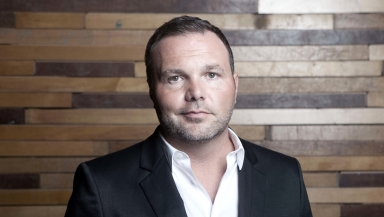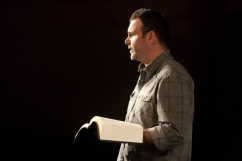
So Mark Driscoll has stepped down from the leadership of Mars Hill, the Seattle mega-church he helped to found. The controversial pastor's resignation – which apparently surprised the eldership of the church – comes at the end of a six-week break from ministry, during which the church investigated various allegations of bullying, sexism and abusive leadership.
Driscoll is a hero to many, and a bogeyman to many more. His uncompromising – and at times arrogant and downright stupid – style has made him one of the most divisive figures of the 21<sup>st century church. So news of his demise (although he hasn't ruled himself out of future ministry) will inspire polarised reactions among Christians. Some will celebrate the removal of a chauvinist bully; others will bemoan the disappearance of a preacher who was unashamed to present the Christian gospel full-on, and who grew a church to nearly 15,000 in a mainly secular area of North America. Those two voices will both be prominent in the next few days; those two views will surely clash, and loudly.
But I'm not sure Jesus would respond in either of those ways.
The brilliant thing about Jesus; the thing that makes him so compelling even just as a wise teacher from history, is that he always seemed to find a third way. When the Pharisees tried to trap him with the old Caesar/God worship question in Matthew 22, his "Give back to Caesar what is Caesar's" response stopped them in their tracks. And when he met someone caught in the shame of adultery, he neither condemned them or let them off the hook. He found a better way to respond than the polarised knee-jerk that most of us would be prone to.
When we get involved in online arguments about issues like this, the watching world only sees reasons not to join our movement. How we all respond to Mark Driscoll's resignation will be seen, and noted, by our friends and by people we don't even know. So in this moment, I want to propose that we find a different way of responding to this news, which is healthier for us, and better illuminates the faith and the God we follow to the watching world.
1. Pray for Mark Driscoll... really.
Whatever your view on Mark Driscoll, none of us would want to switch places with him right now. In his resignation letter he stated that things had even become 'physically unsafe' for him, and his opponents and critics are numerous and vocal. His wife and children will also be under an immense spotlight; all of them deserve our prayers. If you don't know what to pray, just pray they'll be safe and know God close by. And actually pray – even if you find Driscoll incredibly difficult. See it as an act of submission, taking seriously Jesus' command to 'be the last, and the servant to all (Mark 9:35).'
2. Identify the plank in your own eye
Jesus doesn't tell us not to judge each other's failings, but in Matthew 7 he tells us to put our own houses in order first. How many of us have criticised Driscoll – whose failures are in the open – while harbouring our own dark stuff in secret? So if we feel compelled to criticise Driscoll, why don't we see it as a prompt to address some of our own issues first? That's not meant to be smart – it just seems to be what Jesus asks of us.
3. Lovingly challenge those who go too far
Paul talks about 'speaking the truth in love' (Ephesians 4 v 15) – and in the inevitable online chatter which follows this announcement, there will be an awful lot of people ignoring that piece of guidance. So when we see people taking it too far – making hateful remarks or blindly defending the indefensible – let's try to put Paul's idea into practice ourselves and gently encourage those people to find a better, more appropriate way of putting their feelings across. This doesn't need to be a conversational bloodbath – remember, thanks to the joys of the Internet, the world is watching.
4. Get behind a good men's ministry
There's no doubt that in his narrow view of masculinity, Driscoll alienated as many men as he attracted. Yet his congregations reportedly included as many men as women – a trend-bucker if ever there was one – and many, many men became Christians through those churches. So while his methodology was often dodgy or even dangerous, he did identify an uncomfortable truth – that many men respond to a ministry that is oriented specifically towards them, and which takes them out of a traditional church context and talks to them in their language (the same is true of various other niche groups). So instead of getting frustrated at Driscoll the meat-headed bully, get behind a really good, really healthy men's ministry organisation. In the UK, one such organisation is Christian Vision for Men. Look them up.
5. Self-reflect
If Mark Driscoll makes you angry, or if his removal from leadership does so, then this is a great opportunity to practise a bit of inward reflection. Take some time to be quiet, and to meditate on the issues, asking God to help you understand why he provokes such a reaction in you. What things might he be calling you to, which are illuminated by that reaction? For example, is God leading you to fight sexism in your church context? Or conversely, is he challenging you to get back to a passion for the Bible? Most of us don't know Mark Driscoll – this far-off news story is just a stimulus for our reaction; so let's find a way of reacting more profoundly.
6. Take time to understand the man, not the caricature
Whatever you imagine my view of the man to be by this point, I can assure you I feel incredibly mixed. What helped me to feel less polarised was actually engaging with his views, instead of just reading a handful of the worst examples. By listening to Driscoll's Mars Hill podcast for a few weeks (a difficult challenge at the time), I learned that he was both a brilliant theologian and gospel preacher AND prone to saying really unhelpful things. About 90 per cent of his words were excellent; about 10 per cent were pretty unhelpful. On the one hand, that's an awful lot of unhelpful... on the other, I'm not sure my sermons are 90 per cent excellent. The point is – most of us comment on and react to a version of Driscoll that we've been presented by others. Before you hate or defend him, it's worth spending some time finding out who he really is.
7. Recommit to personal evangelism
If there's one undeniable positive about Mark Driscoll, it's that he was and is committed to evangelism, both on a church-wide and personal level. So while it might seem counter intuitive, this is one area where he can be a role model to all of us – pointing the way to Jesus' Great Commission to go and make disciples of all nations. Let's ask ourselves today – are we as committed to mission, and to seeing people encounter and enter relationship with Jesus, as Driscoll? If not, why not? And if so, what are we going to practically do which demonstrates that commitment? It's an area that many parts of the church have gone a bit quiet on – at least Mars Hill didn't do that...
The days ahead will surely see plenty of articles, interviews, blogs and tweets that seek to tear down or defend Mark Driscoll, following the many we've already seen. But wouldn't it be incredible if, on this occasion, Christians didn't resort to online mudslinging, hot-headed argument, and unhealthy demonization? Whatever Jesus thinks about Mark Driscoll, I believe we can all agree that he wouldn't respond like that.
Martin Saunders is an author, screenwriter and the Deputy CEO of Youthscape. Follow him on Twitter @martinsaunders






















